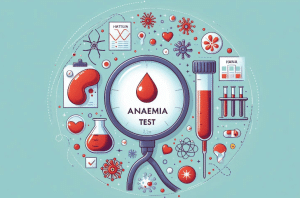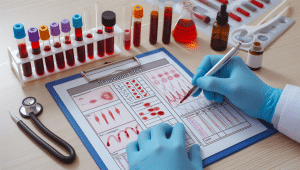What is a Vitamin K Test?
A Vitamin K Test measures the level of vitamin K in your blood. Vitamin K is a fat-soluble vitamin crucial for blood clotting and bone health. There are two main types of vitamin K:
- Vitamin K1 (phylloquinone): Found primarily in leafy green vegetables.
- Vitamin K2 (menaquinone): Produced by bacteria in the intestines and also found in some animal products and fermented foods.
Why Do You Need a Vitamin K Test?
A Vitamin K test is typically ordered when a healthcare professional suspects:
- Vitamin K deficiency: This can lead to excessive bleeding or bruising due to impaired blood clotting. Newborns are particularly susceptible to deficiency due to low vitamin K transfer during pregnancy and limited amounts in breast milk.
- Monitoring anticoagulant therapy (warfarin): Warfarin interferes with vitamin K’s action, requiring regular monitoring to ensure safe and effective dosage.
- Assessing liver function: The liver plays a role in vitamin K metabolism, so abnormal levels might indicate liver problems.
- Malabsorption disorders: Conditions affecting fat absorption can also impact vitamin K uptake.
What Does a Vitamin K Test Measure?
The test primarily measures the concentration of vitamin K1 in your blood. Indirectly, it provides information on:
- Vitamin K status: Whether you have sufficient or deficient levels of vitamin K.
- Blood clotting ability: Vitamin K is essential for producing clotting factors, so the test helps assess your blood’s ability to clot properly.
- Potential health risks: Vitamin K deficiency can increase the risk of bleeding complications.
- Underlying conditions: Abnormal levels might signal issues with liver function or nutrient absorption.
Preparing for the Test
Usually, no specific preparation is needed for a Vitamin K test. However:
- Fasting: Some labs might require fasting for a certain period before the test. Check with your healthcare provider.
- Medications: Inform your doctor about all medications and supplements you are taking, as some can affect vitamin K levels, especially warfarin and other blood thinners.
Understanding the Results
Normal vitamin K levels generally range between 0.2-2.2 ng/mL. The interpretation might vary depending on the lab and individual factors.
- Low levels (deficiency): This can lead to prolonged bleeding time and increased risk of bleeding complications.
- High levels: Excess vitamin K is rare and usually not a cause for concern.
- Normal levels: Indicate adequate vitamin K status.
Risk Factors and Prevention
Factors increasing the risk of vitamin K deficiency include:
- Newborns: They have low vitamin K stores at birth.
- Malabsorption disorders: Conditions affecting fat absorption can impact vitamin K uptake.
- Long-term antibiotic use: Certain antibiotics can disrupt the gut bacteria that produce vitamin K2.
- Liver disease: Impaired liver function can affect vitamin K metabolism.
Prevention and management involve:
- Balanced diet: Include plenty of vitamin K-rich foods like leafy green vegetables, broccoli, Brussels sprouts, and some fermented foods.
- Supplementation: In certain cases, like newborns or individuals with malabsorption issues, vitamin K supplements might be recommended.
- Addressing underlying conditions: Treating any conditions causing malabsorption or affecting nutrient uptake is important.
- Caution with anticoagulants: If you are taking warfarin or other blood thinners, regular monitoring of vitamin K levels and dietary intake is crucial.
Remember, maintaining optimal vitamin K levels is important for proper blood clotting and bone health. Consult with your healthcare provider if you have any concerns or suspect a deficiency.

 7351982473
7351982473











